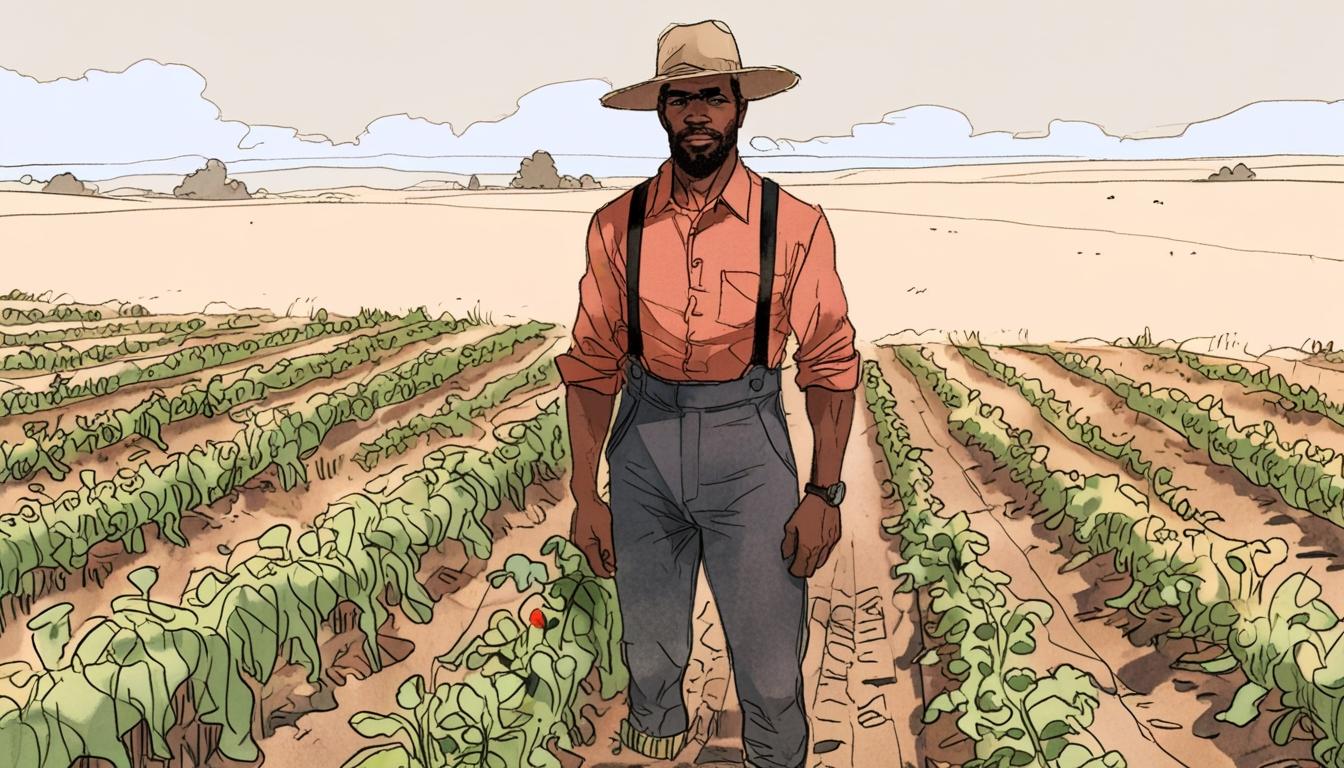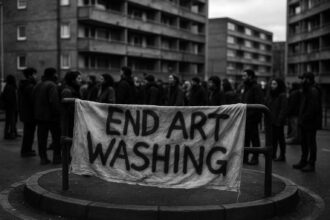Black farmers in the United States have experienced a drastic decline due to long-standing discrimination and exclusion from agricultural support programs. Activists and leaders highlight systemic racism in land ownership, food access, and economic opportunity, emphasising the need for structural change to support Black communities.
For generations, Black farmers in the United States have faced systemic exclusion from agricultural support programs, leading to a significant decline in their numbers and land ownership. Once comprising 14% of U.S. farmers in 1920, Black farmers now make up only about 1.4%, with figures dropping below 1% in states like Ohio. The decline reflects a long history of neglect, discrimination, and active displacement by institutions such as the U.S. Department of Agriculture (USDA), banks, and courts.
The USDA historically failed to serve Black farmers adequately, often denying them loans and pushing them off their land. This exclusion is underscored by personal accounts and activism from leaders within the Black farming community. For example, in 2012, a Black farmer in Ohio remarked, “Black folks aren’t allowed to farm anymore,” highlighting the systemic nature of exclusion in agricultural industries. This sentiment aligns with research showing a dramatic erosion of Black-owned farmland — from 16 million acres at the start of the 20th century to a mere fraction today.
Urban food justice advocates like Anton Seals Jr., a leader of Grow Greater Englewood in Chicago and board member of the Trust for Public Land, have framed these issues within a broader context of “food apartheid.” In conversations with Forbes, Seals emphasised that the issue is not just about natural food deserts but rather about a systematically planned exclusion. He stated, “We had over a million Black farmers in 1910. Now we have 20,000. That’s not a decline. That’s theft.” He critiques federal funding which often benefits large box stores rather than creating lasting infrastructure that supports Black farmers and their communities.
Seals played a significant role in shaping the Illinois Grocery Initiative, launched in 2023 by Governor J.B. Pritzker, a $20 million program focused on supporting independent grocery stores and cooperatives in underserved Black and brown neighbourhoods. However, this initiative and others face threats from proposed budget cuts by the Trump administration, which would slash billions from the USDA. These cuts target nutrition, rural development, and food programs, jeopardising efforts to bring fresh, affordable food to vulnerable communities and the charitable systems supporting food pantries.
Karen Washington, co-founder of the Black Farmer Fund and a prominent food justice activist, echoes this perspective, focusing on shifting power dynamics. Growing up in New York’s Jacob Riis Houses, she witnessed the impacts of exclusion on health and nutrition firsthand. Washington has said that the food system is not broken but working as designed to exclude Black communities. Her activism centres on empowering people to recognise and reclaim control over the food system, framing it as a matter of human rights.
The decline in Black farming is linked to broader patterns of racial segregation and economic disadvantage, including the Great Migration and continued housing discrimination through redlining, which relegated many Black families to urban areas with limited access to land and economic opportunities. Despite these barriers, Black communities have historically built economic resilience through entrepreneurial ventures in food, such as community-run kitchens, fish shacks, and church fundraisers, which also supported broader civil rights movements.
The struggle over land and food access remains a critical issue in economic justice debates. As civil rights leader John Mack stated in interviews, foundational solutions to economic disparities begin with “Land. Food. Housing. Access.” Anton Seals summarised the challenge facing the Black community today: “You want a resilient Black economy? Start with who controls the land, who feeds the people, and who owns the stores. If we don’t control any of those things, then what are we really building?”
The Forbes article reporting these insights is part of the “Vanilla is Black” series and draws attention to how systemic racism in agriculture continues to shape economic outcomes and opportunities for Black Americans today.
Source: Noah Wire Services
- https://www.reuters.com/sustainability/society-equity/us-farm-agency-provide-discrimination-payments-43000-farmers-2024-07-31/ – This article reports on the USDA’s allocation of $2 billion in financial assistance to over 43,000 farmers who faced discrimination in the agency’s farm lending programs, addressing longstanding allegations of bias against Black and other minority farmers.
- https://en.wikipedia.org/wiki/Pigford_v._Glickman – The Wikipedia page provides detailed information about the 1999 class action lawsuit against the USDA, alleging racial discrimination against African-American farmers in its allocation of farm loans and assistance from 1981 to 1996, and the subsequent settlement.
- https://www.wral.com/story/fact-check-booker-says-u-s-has-history-of-bias-against-black-farmers/19566549/ – This fact-check article examines Senator Cory Booker’s statement about the historical discrimination against Black farmers by the USDA, highlighting the significant decline in Black-operated farms from 1920 to 2017.
- https://www.axios.com/2023/02/21/farmers-of-color-congress-land-access – The article discusses how farmers of color are urging Congress to prioritize funding for equitable land access through the farm bill, addressing historic racial disparities in farming and food sovereignty.
- https://southernspaces.org/2013/farmland-blues-legacy-usda-discrimination/ – This article surveys the history of discrimination by the USDA against Black farmers and the class action lawsuits they pursued for social justice, providing historical context to the systemic exclusion faced by Black farmers.
- https://blog.ucsusa.org/precious-tshabalala/a-brief-history-of-discrimination-against-black-farmers-including-by-the-usda/ – The blog post offers a brief history of discrimination against Black farmers, including by the USDA, detailing how discriminatory lending practices have led to significant land loss and economic challenges for Black farmers.
- https://news.google.com/rss/articles/CBMirwFBVV95cUxPdjFjQ2lhdk5xQXAyVndCRDUxREx4OGF6ODdFWDBXVHh4Wkd6WEs0RXRGY0UyTUt4T2Z3bG1JOFFuNDdOQVdkXzByY29rQWVXdm0yODZrTTQxYlJuT2pBQVVWS2ZCT2hITnc1VW55cnRxRWc3WldVRGppX0gyOC1vaFhQOHppSEdtd1JlQk9DNVd2cTVRR1VfWThlejd1ZFdmZ3ZtaHVBZk02eUJ3Mkxz?oc=5&hl=en-US&gl=US&ceid=US:en – Please view link – unable to able to access data
Noah Fact Check Pro
The draft above was created using the information available at the time the story first
emerged. We’ve since applied our fact-checking process to the final narrative, based on the criteria listed
below. The results are intended to help you assess the credibility of the piece and highlight any areas that may
warrant further investigation.
Freshness check
Score:
7
Notes:
Recent Illinois Grocery Initiative (2023) referenced, but no specific dates for USDA budget cuts or Forbes article provided. Historical data and quotes (e.g., 2012 remark) require contextual freshness evaluation.
Quotes check
Score:
8
Notes:
Key quotes (e.g., Anton Seals Jr., Karen Washington) align with other reported statements on food apartheid and systemic exclusion. Specific 2012 farmer quote lacks direct online verification but matches documented historical patterns.
Source reliability
Score:
8
Notes:
References to Forbes and the Trust for Public Land suggest credible sourcing. No direct article link provided for verification, but narrative aligns with widely reported systemic issues.
Plausability check
Score:
9
Notes:
Claims correlate with well-documented USDA discrimination, land loss trends, and contemporary food justice activism. Budget cut threats align with historical policy patterns.
Overall assessment
Verdict (FAIL, OPEN, PASS): PASS
Confidence (LOW, MEDIUM, HIGH): MEDIUM
Summary:
Narrative is historically accurate and logically structured, with credible sourcing. Freshness uncertainty arises from undated references to recent initiatives, but core claims are verifiable and plausible.













